
How to Write a Geography Essay that Transcends Borders

Have you ever found yourself floating effortlessly in the Dead Sea, that magical stretch of water between Israel and Jordan? It's the saltiest lake globally, turning you into a buoyant bobber without much effort. Now, just as geography unveils such fascinating quirks about our planet, writing an essay on this subject can be an equally intriguing venture.
Let's take a stroll through the world of geography essays together. We'll start by figuring out what exactly makes up a geography essay definition and then dive into the secrets of writing a great one. Along the way, we'll share some helpful tips, break down the important parts, and talk about why geography matters in today's world. Whether you're a student trying to do well in your geography class or just curious about why geography is important, this article is here for you. Let's get started!
Ready to Turn Your Passion for Places into an Epic Essay?
Geography geek or not, we've got your back. Let us craft your custom essay that's as intriguing as it is insightful!
Essential Factors When Writing a Geography Essay
A great essay comes from a good understanding of the topic. Let's share some tips to help you create an impressive essay.
- Stick to What You Know : Pick geography topics that you're familiar with.
- Think Global : Show how your chosen topic connects to bigger issues like climate change or cultural diversity.
- Grab Attention : Choose a topic that interests you and your readers.
- Show with Examples : Use real examples to explain geography concepts in your essay.
- Stay on Track : Make sure everything in your essay relates to the main message.
- Use Sources : Share your thoughts based on what reliable sources say.
- Make it Real : Describe landscapes in a way that brings them to life for your readers.
In the next parts, our skilled writers, who you can buy essay from, will share a simple guide to help you write essays successfully!
Exploring What Is a Geography Essay
In simple terms, a geography essay is a well-organized explanation of geographic topics and ideas. It's more than just listing facts—it's a chance for you to showcase what you understand about geographical principles, processes, and their real-world impacts.
.webp)
- Keep it Focused : Your essay should revolve around a specific topic or question in geography. This focus helps you stay on track and make your writing clear and relevant.
- Grasp the Concepts : Geography essays should include important geographical ideas like spatial relationships, scale, location, and interactions. These concepts give you the tools to understand and explain the world.
- Use Data : Geography relies on data and evidence. Bring in facts, maps, visuals, and statistics to support your points and show geographical patterns.
- Think Critically : A good essay doesn't just share information; it digs into the details. Explore the nuances, root causes, and broader impacts to give a deeper insight.
- Connect to Reality: These essays often link theory with real-world issues. Whether you're talking about global warming, urbanization, cultural landscapes, or geopolitical shifts, these essays show why geography matters in our interconnected world.
How to Start a Geography Essay
Starting your essay in the right way not only grabs your readers' attention but also sets the stage for a well-organized and interesting exploration of your selected geography research paper topics .
- Establish the Geography : Kick-off by placing your topic in a geographic context. Explain where and why this topic matters, considering both local and global perspectives.
- Spark Interest : Draw your readers in by asking a thought-provoking question or sharing a surprising statistic related to your geography essay topics.
- Give Background Info : Provide a quick overview of the subject to make sure your readers have the basic knowledge needed to follow your arguments.
- Include a Quote : Think about using a fitting quote from a well-known geographer, researcher, or historical figure to add depth and credibility to your introduction.
- Set the Tone : Decide on the tone of your essay—whether it's informative, analytical, or persuasive—and let that tone shine through in your introductory language and style.
Select a Subject You're Comfortable Discussing
Picking the right research paper topic in geography is a big deal—it can really shape how the whole writing journey goes. One smart move to kick off your research paper well is to go for a subject you genuinely feel comfortable talking about. Here's why it matters:
- Expertise Shines : When your research paper topic matches what you already know and enjoy, your expertise shines through. You can use what you know to analyze and explain the subject better.
- Stay Motivated : Choosing a topic that genuinely interests you, like doing a geography essay about earthquakes, can be a great source of motivation. This inner drive helps you stay engaged during the whole research and writing process, leading to a better end result.
- Research Efficiency : Knowing your topic makes the research process smoother. You know where to find good sources, what keywords to use, and how to tell if information is reliable.
- Confident Analysis : Understanding your topic well, say, when dealing with a geography essay about global warming, gives you confidence. This confidence comes through in your analysis, making it more convincing.
- Boosted Creativity : Being comfortable with your topic can boost your creativity. You're more likely to come up with new ideas and unique perspectives when you're discussing something you're familiar with.
Let's explore a range of research topics that provide plenty of chances for thorough investigation and analysis. Feel free to choose the one that aligns with your interests and fits the particular focus of your research.
- Microclimates in Urban Spaces: Analyzing Local Community Impacts
- Geopolitics of Water Scarcity: Transboundary Water Conflict Case Study
- Ecotourism in Unexplored Territories: Balancing Conservation and Development
- Digital Cartography's Influence on Public Perception of Geographic Information
- Role of Indigenous Knowledge in Sustainable Resource Management
- Urban Heat Islands: Assessing Heat-Related Risks in Growing Cities
- Climate Change Impact on Traditional Agricultural Practices in Vulnerable Regions
- Geography of Infectious Diseases: Spatial Analysis of Disease Spread
- Patterns of Renewable Energy Adoption: A Global Comparative Study
- Cultural Landscapes in Transition: Globalization's Impact on Local Identities
Geography Essay Example
For a closer look at how to structure and compose an effective geography essay, we've put together a compelling example for your review. As you go through it, you'll discover the essential elements that contribute to making an essay both informative and engaging.
Exploring the Impact of River Dams on Ecosystems
Introduction:
Rivers are the lifeblood of many ecosystems, shaping landscapes and sustaining diverse forms of life. This essay delves into the intricate relationship between river dams and ecosystems, aiming to unravel the multifaceted consequences that altering natural watercourses can bring. By examining case studies and ecological principles, we seek to shed light on the complex web of interactions that define the impact of river dams on the environment.
River dams significantly modify the natural flow of water, creating reservoirs and altering the hydrological patterns downstream. This transformation often leads to changes in habitat availability for aquatic species. Case studies from various dam projects will be explored to illustrate the tangible effects on biodiversity and ecosystem structure.
Furthermore, many fish species rely on river systems for migration and spawning. Dams can present barriers to these natural processes, affecting fish populations and, consequently, the predators and prey in the broader food web. This section will examine how dams disrupt fish migration and explore potential mitigation strategies to minimize ecological consequences.
What's more, the alteration of river flow caused by dams influences water quality and sediment transport downstream. Sediment accumulation in reservoirs can have cascading effects on aquatic ecosystems. This part of the essay will delve into scientific studies highlighting changes in water quality and sedimentation patterns due to dam construction.
Beyond the ecological realm, the construction of river dams often has social and economic repercussions. Local communities dependent on rivers for their livelihoods may face challenges due to altered water regimes. Investigating case studies, we will explore the human dimension of the impact of river dams on communities and economies.
Conclusion:
In summary, the complex interplay between river dams and ecosystems demands thoughtful reflection. This essay has offered a glimpse into the diverse outcomes that come with changing natural watercourses, underscoring the importance of a comprehensive grasp of the ecological, social, and economic aspects at play. By delving into the intricate realm of river dam impacts, we acquire valuable insights into the nuanced equilibrium between human progress and environmental sustainability.
How to Write a Geography Essay: Insights and Pointers
When it comes to writing geography essays, it's not just about throwing out facts and figures. It's about digging deeper into geographical ideas, understanding how things relate, and sharing your findings in a way that makes sense. Our paper writing service experts are here to give you some handy tips:
- Dig Deep with Research: Start by really getting into your topic. Collect data, look at maps, and read up on what others have to say about it.
- Sort Your Thoughts: Organize your essay so it's easy to follow. That usually means having an intro, some main parts, and a wrap-up at the end. Keep it logical.
- Think and Talk Analysis: Get into the nitty-gritty of your analysis. Use geography ideas to explain your data and give your own take on things.
- Show Your Proof: Back up what you're saying with proof. Throw in maps, charts, or stories to make your points and show patterns.
- Question Everything: Think hard about different opinions and what your findings might mean in the big picture. Don't be afraid to question things and see where it takes you.
Breaking Down the Geography Essay Structure
A well-formatted geography essay structure is like a well-organized map – it guides readers through your analysis with clarity and purpose. To effectively break down the structure, consider the following key insights:
- Geographical Essence: Always consider the geographical context when framing your essay format . How does the landscape influence the subject, and in turn, how does it fit into the broader global narrative?
- Tailored Tone for Audience: Reflect on your audience. Are you speaking to geography enthusiasts, educators, policymakers, or the general public? Adjust your language and explanations to match their level of familiarity and interest.
- Conciseness and Wordplay: Maintain clarity by adhering to word limits and embracing conciseness. Focus on delivering pertinent information with a touch of engaging wordplay to captivate your readers.
- Innovative Perspectives: Aim for innovation in your analysis. While leveraging existing research, offer a fresh viewpoint or a unique twist on the topic to keep your essay from blending into the background.
- Ethical Dimensions: If your research involves human subjects, sensitive data, or fieldwork, be conscientious of ethical considerations. Seek necessary approvals, ensuring that your research adheres to ethical standards.
- Geographic Fluency: Demonstrate a keen grasp of geographic fluency in your essay. Showcase not just knowledge of concepts but an understanding of the interconnectedness of regions, adding depth to your exploration.
- Visual Appeal: Consider incorporating visual elements such as maps, charts, or images to enhance your essay's visual appeal. A well-chosen visual can often communicate complex geographical information more effectively.
- Future Implications: Extend your analysis to contemplate the future implications of the geographical factors you're discussing. How might current trends shape future landscapes, and what role does your topic play in this evolving narrative?
Geography Essay Introduction
The introductory paragraph is the starting point of your essay, where you contextualize, captivate your audience, and introduce your central thesis statement.
For instance, if your essay explores the effects of rising sea levels on coastal communities, your introduction could commence with a striking observation: ' In the coastal realms, where communities have thrived for generations, the encroaching rise of sea levels is transforming the very landscapes that have long shaped human existence. This unsettling shift is a direct consequence of global warming, a phenomenon casting profound implications across the globe .'
The core section of your essay, the main body, encompasses several paragraphs that house your analysis, arguments, evidence, and illustrations.
Within a segment examining the consequences of industrial pollution on river ecosystems, you might assert: ' Industrial effluents discharged into rivers represent a significant contributor to pollution. As evidenced by studies [cite], the toxic chemicals and pollutants released into water bodies pose severe threats to aquatic life, disrupting ecosystems and endangering the delicate balance of river environments. '
Geography Essay Summing Up
When wondering how to write a conclusion for an essay , remember that it acts as the final chapter, summarizing crucial findings, reiterating your thesis, and offering concluding insights or implications.
In a conclusion addressing the impact of desertification on agricultural communities, you might recapitulate: ' Surveying the intricate interplay between environmental degradation and agricultural sustainability in regions affected by desertification reveals a nuanced narrative. Despite the adversities posed, there exists an imperative for innovative solutions and adaptive strategies to ensure the resilience of agricultural communities in the face of advancing desertification. '
More Tips for Writing a Geography Essay
Here are some special tips on writing a geography essay that can enhance the depth and sophistication of your entire piece, showcasing a thorough grasp of geographic concepts and methods.
- Embrace diverse viewpoints – consider cultural, economic, and environmental angles for a richer analysis.
- Use geospatial tools like maps and satellite imagery to visually enhance your essay and emphasize spatial relationships.
- Bolster your arguments with real case studies to illustrate the practical application of your geographical analysis.
- Integrate recent global events into your essay to showcase relevance and stay aligned with the dynamic nature of geography.
- Explore intersections with other disciplines, providing a more comprehensive understanding of your topic.
- Highlight how local phenomena contribute to broader global narratives, emphasizing interconnectedness.
- If you're writing a cause and effect essay , compare urbanization trends in different cities to show the reasons and outcomes.
Why Geography Matters as a Subject of Study
Geography goes way beyond just maps and names of places; it's a lively and important field that helps us make sense of the world. Here's why geography matters:
.webp)
- Knowing Spaces: It helps us understand how places, regions, and landscapes connect. This understanding is crucial for making smart choices about things like where to put resources, plan cities, and handle emergencies.
- Being a Global Citizen: It encourages us to appreciate different cultures and how we're all connected. It helps us see how big events, like climate change or pandemics, affect countries locally and globally.
- Taking Care of Nature: This subject gives us insights into environmental problems and solutions. It teaches us about issues like cutting down forests, losing habitats, and climate change so we can make choices that help our planet.
- Thinking Smart: Geography makes us think critically. It involves looking at complex information, considering different opinions, and drawing smart conclusions. These skills are handy in lots of jobs.
- Fixing Real Problems: What we learn in geography helps us solve actual problems – from designing better roads to managing water wisely and dealing with natural disasters.
- Making Rules and Plans: It has a say in making rules and plans. It guides decisions about how to use land, build things, and take care of resources.
- Loving Different Cultures: Geography helps us appreciate all kinds of cultures and how they relate to the environment. It lets us understand why places are important and how their histories have shaped them.
Ready to Explore the World without Leaving Your Desk?
Let our expert writers be your guides on this geographical voyage and map out your academic success together!
To sum it up, geography gives you the knowledge and skills to navigate our complex and connected world. Writing a geography essay helps you make smart choices, promote sustainability, and face global challenges. Whether you're exploring local landscapes or looking at global issues, geography lays the groundwork for understanding our planet and its diverse inhabitants through the art of essay writing.

Daniel Parker
is a seasoned educational writer focusing on scholarship guidance, research papers, and various forms of academic essays including reflective and narrative essays. His expertise also extends to detailed case studies. A scholar with a background in English Literature and Education, Daniel’s work on EssayPro blog aims to support students in achieving academic excellence and securing scholarships. His hobbies include reading classic literature and participating in academic forums.

is an expert in nursing and healthcare, with a strong background in history, law, and literature. Holding advanced degrees in nursing and public health, his analytical approach and comprehensive knowledge help students navigate complex topics. On EssayPro blog, Adam provides insightful articles on everything from historical analysis to the intricacies of healthcare policies. In his downtime, he enjoys historical documentaries and volunteering at local clinics.
Related Articles
%20(3).webp)
How to Write Geography Essay: Topics and Examples
Table of contents
- 1 What Is Geography Essay
- 2 Choosing a Topic
- 3 Research and Data Collection
- 4 Planning the Essay
- 5 Writing the Essay
- 6 Examples of Geography Essays
- 7 Unlocking the World: Key Insights from Our Geographic Exploration
Welcome to the dynamic world of geography essays, where understanding the Earth’s surface becomes an enlightening journey. This article serves as a comprehensive guide to writing a geography essay, starting with the crucial step of selecting a captivating topic. We’ll navigate through various popular topics, emphasizing the importance of effective research and data collection.
In this article, we’ll cover:
- How to select engaging and relevant geography essay topics.
- The importance of thorough research and effective data collection methods.
- Strategies for planning and organizing your geography essay for clarity and impact.
- Tips for writing a compelling geography essay, including structuring and presenting arguments.
- Analyzing examples of successful geography essays to guide and inspire your work.
As we transition into the details, prepare to enhance your understanding and skills in geography essay writing.
What Is Geography Essay
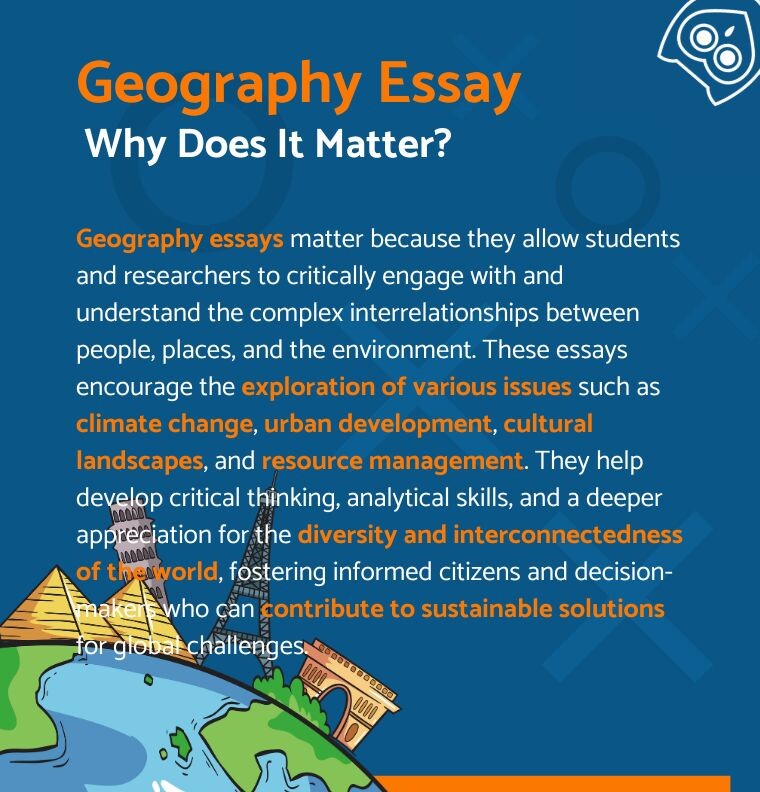
As we delve into the essence of a geography essay, it’s important to understand that it meticulously examines Earth’s landscapes and human activities. Furthermore, it aims to analyze how these two aspects interact, focusing on spatial relationships and patterns. Transitioning into the specifics, such essays often delve into particular geographic issues, aiming to broaden our comprehension of the world.
Moreover, when writing a geography essay, one must include accurate geographical data. This data, encompassing maps, statistics, and case studies, is crucial for a well-grounded analysis. Consequently, the essay should present facts and interpret them, offering fresh insights into the discussed topic.
Additionally, it’s noteworthy that an essay on geography stands out from others due to its unique subject matter approach. It demands a keen eye for detail and a profound understanding of the world’s physical and human dimensions. This requirement makes crafting such an essay a challenging yet fulfilling endeavor.
Lastly, the primary goal of a geography essay is to enlighten and inform. It persuades readers to view the world through a geographical lens, grasping the complex interplay between humans and their environment. This type of essay transcends mere academic exercise, serving as a means to foster a deeper appreciation for our world and its complex dynamics.
Choosing a Topic
The crucial point for a successful geography essay is selecting an engaging and appropriate topic. To choose a topic that resonates, consider current events, your interests, and the scope of your assignment. A good topic should captivate your interest and offer sufficient scope for in-depth study and analysis.
Popular geography essay topics often revolve around climate change , urban development, and cultural landscapes. These topics provide a rich ground for exploration and allow for diverse perspectives and interpretations. For example, a thematic essay on geography could focus on how urbanization affects local ecosystems or how cultural practices shape landscape use.
- Analyzing the Direct Impact of Climate Change on the Amazon Rainforest’s Biodiversity
- Urbanization in Mega Cities: Environmental Consequences and Sustainable Solutions
- Wind and Solar Power: Pioneers of Sustainable Energy Landscape
- Managing Water Scarcity in the Middle East: Strategies and Challenges
- The Amazon Deforestation Crisis: Causes, Impacts, and Global Responses
- Spatial Inequality: A Detailed Look at Poverty in Sub-Saharan Africa
- The Dynamics of Population Growth and Overconsumption in Asia
- Cultural Preservation of Indigenous Peoples in the Amazon Basin
- Earthquakes in Japan: Analyzing Causes, Effects, and Preparedness Strategies
- Geography’s Role in the Rise and Fall of the Roman Empire
- Implementing Sustainable Agricultural Practices in India for Food Security
- The Kashmir Conflict: A Geopolitical Analysis of Border Disputes
- The Growing Crisis of Climate Refugees in the Pacific Islands
- The Importance of Urban Green Spaces in New York City’s Environmental Health
- The Impact of Globalization on Maori Culture in New Zealand
- Ecotourism in Costa Rica: Balancing Economic Benefits and Environmental Preservation
- Addressing Ocean Plastic Pollution: Case Studies from the Great Pacific Garbage Patch
- The Nile River Conflict: Water Politics in a Changing Climate
- Preventing Desertification in the Sahel: Strategies and International Cooperation
- GIS in Disaster Management: Case Studies of Earthquake Response and Recovery
- Measuring the Effects of Glacial Melting on Greenland’s Coastal Communities
- Tracing the Economic Geography of the Silk Road in the 21st Century
- The Health Impacts of Air Pollution in Beijing: Urban Policies and Challenges
- Vulnerable Communities: Assessing the Socioeconomic Impacts of Climate Change in Bangladesh
- The New Face of Migration: Syrian Refugees and European Response
- The Critical Role of Metropolitan Areas in Combating Global Warming
- Saving Madagascar’s Rainforest: Conservation Strategies and Challenges
- The Transition to Renewable Energy in Germany: A Model for the World?
- Satellite Imagery in Land Use Changes: A Study of the Brazilian Amazon
- Arctic Sovereignty: The Geopolitical Implications of Melting Ice Caps for Global Powers
To guide and inspire your topic selection, you can use geography essay examples. These examples showcase a range of topics and approaches, helping you understand what makes a topic both engaging and feasible for study. Remember, a well-chosen topic is the first step toward a compelling and insightful geography essay.
Research and Data Collection
To talk about thorough research, it is the backbone of any geography study, providing the factual and theoretical foundation to understand complex geographical phenomena. To explain why the study of geography is important, one must delve into diverse and reliable sources that offer insights into how geographical factors shape our world and affect our lives. This research underpins the type of geography being studied, whether physical, human, or environmental.
Collecting geographical data can be done through various methods. Firstly, fieldwork is essential, especially for physical geography, as it allows for the direct observation and measurement of geographical features and processes. For human geography, surveys and interviews can yield valuable data on human behaviors and social patterns. Moreover, a thorough literature review also helps understand existing research and theories, providing a critical context for new findings.
Furthermore, evaluating sources for their credibility and relevance is vital. This involves checking the qualifications of the authors, the rigor of their methodologies, and the recency of their findings. Reliable sources are peer-reviewed and come from reputable academic or scientific institutions. What is more, ensuring the credibility of sources strengthens the arguments made in a geography essay and enhances the overall understanding of the topic.
In summary, comprehensive research and careful data collection are fundamental in geography. They enable a deeper understanding of how geographical aspects shape our environment and lives, which is central to the discipline.
Planning the Essay
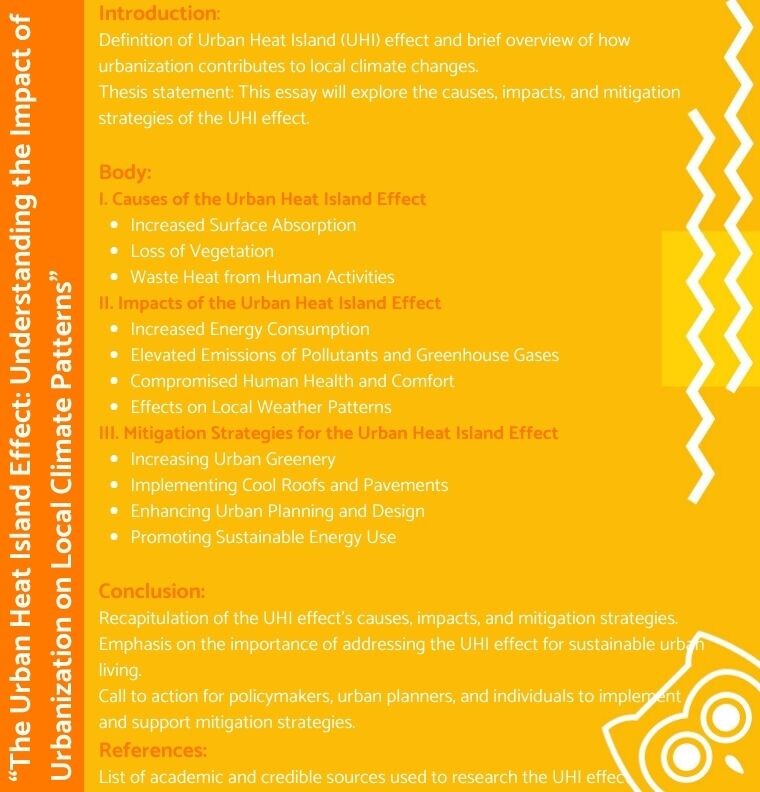
When you start planning a geography essay, it begins with creating an outline to organize thoughts and research. This step is crucial as it helps structure the essay logically, ensuring a smooth flow of ideas. Start by listing major points and supporting evidence. This framework guides the writing process and maintains focus on the chosen topic. Planning involves outlining the essay and crafting a compelling thesis. Planning involves outlining the essay and crafting a compelling thesis. This process ensures the essay remains focused and coherent, addressing the chosen geography topic. By establishing a clear roadmap for the essay, writers can navigate their arguments and evidence with precision, avoiding common pitfalls such as digression or ambiguity. Now, with our plan in place, let’s transition to examining the structure more closely, exploring how to effectively organize our thoughts and research into a well-structured essay that engages and informs the reader.
Writing the Essay
When you finally start writing, a geographical essay involves several key steps, each demanding attention to detail and a balance between descriptive and analytical writing. This balance is crucial in creating an essay about geography that informs, engages, and persuades.
The introduction sets the stage. Start with a hook that grabs the reader’s attention, followed by background information that provides context to the topic. This section should conclude with a clear and concise thesis statement that guides the rest of the essay.
In the body, organize paragraphs thematically or chronologically , depending on the essay’s focus. Each paragraph should start with a topic sentence that relates to the thesis. Following this, present your arguments and support them with geographical theories and data. This is where you incorporate detailed information from your research, including statistics, case studies, and examples. Make sure to explain how this data supports your arguments. A geography research paper demands precision in presenting data and clarity in its interpretation.
When discussing geographical theories, link them directly to your topic. This shows your understanding of the subject and how these theories apply to real-world scenarios. Remember, each paragraph should have a smooth transition to the next, maintaining a coherent flow of ideas.
In the conclusion, summarize the key points of your essay. Restate the thesis in light of the arguments and evidence presented. The conclusion should not introduce new information but encapsulate what the essay has covered. It’s also an opportunity to emphasize the importance of the topic, suggesting potential areas for future research or implications of your findings.
Throughout the essay, maintain a balance between descriptive and analytical writing . Descriptive writing helps paint a picture for the reader, making the data and theories more relatable. Analytical writing, on the other hand, demonstrates your ability to think critically about the topic, evaluating and interpreting the information in a meaningful way.
Examples of Geography Essays
Diversity in style and approach marks the essence of geography writing. A popular method is the comparative approach, contrasting different geographical phenomena. This method often appears in works comparing landscapes or urban vs. rural areas. Another common technique is the case study, focusing on a specific location or event for in-depth analysis of a particular issue.
Thematic approaches cover broader topics like climate change, globalization, or human migration, weaving together various theories and data for a comprehensive view. Additionally, argumentative compositions present a thesis supported by geographical evidence, frequently seen in discussions about environmental policies or land use conflicts.
Each style offers unique insights, providing varied ways to explore and understand geographical concepts and issues. For an in-depth exploration and diverse perspectives on these topics, consider reviewing geography essay examples. This resource can enrich your understanding and offer a broad spectrum of approaches to geographical analysis, from case studies on environmental conservation to essays on urban development and spatial inequalities.
- Geography Unveiled: Costa Rica’s Absolute Location Revealed
- Geography Unveiled: Navigating Earth’s Spatial Tapestry through Five Themes
- The Ever-Changing Canvas of New England Weather
- The Mystique and Marvels of the Desert Biome
- The Impact of Geography on the Development of Egypt
Unlocking the World: Key Insights from Our Geographic Exploration
This journey through the realm of geography reveals the field’s depth and complexity. From initial planning to diverse writing methods, the main insight stands out: geography compositions are more than maps and data; they are about comprehending our world’s rich tapestry. They balance descriptive narrative and critical analysis, backed by meticulous research and credible sources.
Whether exploring climate change impacts, urban developments, or cultural landscapes, these works offer a lens to see and understand the world anew. They prompt critical thinking about our environment and our place in it. Navigating various geographic topics brings not just academic insights but also life lessons in appreciating our world’s complexity and beauty.
Readers also enjoyed

WHY WAIT? PLACE AN ORDER RIGHT NOW!
Just fill out the form, press the button, and have no worries!
We use cookies to give you the best experience possible. By continuing we’ll assume you board with our cookie policy.
How to master A Level Geography 20-mark essay questions
- Study Skills

- Share Article

What should I do before attempting an A Level Geography 20-mark essay question?
Should i plan an a level geography 20-mark essay, how should i structure an a level geography 20-mark essay.
As we run up to exam season, many of you will now be completing your NEAs (non-examined assessment) and exam content, and starting to focus on exam technique. You may be thinking about how you will tackle the dreaded 20-mark essay questions . Essay questions are very much like marmite for students. Some love them as they get the chance to explore key geographic theories and showcase their knowledge and understanding, which may not be possible in lower-stakes questions. However, others may struggle to formulate their geographic ideas or structure them in a way that makes a convincing argument.
In my experience, all A Level geography students must be systematic and structured in the way they write their long-form answers. This approach ensures that students cover all the necessary content while also demonstrating the geographic skills that examiners are assessing.
Examiners use both AO1 and AO2 to evaluate students in essay questions. AO1 requires students to demonstrate knowledge and understanding of places, environments, concepts, processes, interactions and change at various scales. AO2 deals with the application of knowledge and understanding in different contexts to interpret, analyse, and evaluate geographical information and issues. The strongest students can produce answers that balance the two aspects in their responses. If you weigh your answers too far toward knowledge recall and simply state facts, figures, and case study knowledge without doing anything with the knowledge (this is where command words are essential), you will not be able to achieve the highest levels described in the level descriptors.
Before you attempt essay questions, I suggest you take a look at the mark schemes for some past paper questions. It is important to focus on the level descriptors as these are what the examiners will use to assess your answers. Pay attention to the language they use to describe what they are looking for, and when you start your attempts, consider whether your language and writing style match the descriptors. The exam board mark schemes are available on the PMT A Level Geography past papers webpage .
Another place to look before attempting essay questions is the assessed sample answers produced by the exam boards (e.g. AQA Paper 1 Hazards Example Responses ). These are available on the exam board websites and show a range of pupil responses to exam questions. They come with a helpful commentary that explains how the pupils gained marks, highlights the importance of a well-structured response, and provides insight into what examiners are looking for when assessing your answers.

Where to start – command words
As mentioned above, it is very important for students to be systematic in their approach to answering 20 markers. The first thing students need to understand is the command word . Without knowledge of what the command word means and what it is asking you to do, you will not be able to fully engage with the question. To find out the meaning of different command words , you should visit your exam board’s website and look in the specification.
Essay questions tend to use the command words “to what extent” or “assess” . According to AQA, if the question includes the “to what extent” command word, you should “Consider several options, ideas or arguments and come to a conclusion about their importance/success/worth”. On the other hand, if it is an “assess” question, you should “use evidence to weigh up the options to determine the relative significance of something. Give balanced consideration to all factors and identify which are the most important.”
BUG the question
Command words can help guide you in how to structure your answers and the skills you need to exhibit. During KS3 and KS4, you may have been told to BUG the question, where B stands for box the command work , U for underline key terms , and G for glance back at the question .
I would encourage all A Level students to continue to use this strategy, even for longer essay questions. It will help ensure that you are answering the question you are being asked, rather than the question you wish you were being asked.
Failure to prepare is preparing to fail.
It is crucial for all students to plan their essay writing before they start answering a question. An essay question requires you to write for a sustained period, and if you don’t have a clear plan for what you’re going to write, you may lose focus on your points and arguments and not fully answer the question.
I suggest that all A Level students write a brief plan before attempting the question . This plan should outline the introduction, including key terms to define and any case studies to introduce, the main argument in each of your paragraphs, and finally, the contents of your conclusion. Spending just five minutes on this will save you time in the long run and help keep you on track to answering the question fully.

Looking for support with your AS Level Geography revision?
Our two-day Geography AS Level May Half-term Revision Course is designed to get Year 12 students up to speed for their end-of-year assessments. Book now and enjoy a 10% discount with the code GEOGBLOG10 .
A good structure is key to success in essay writing. A clear structure enables you to answer the question coherently and reduces the chance that you will lose the key focus of your points. All of the exam boards recommend following the structure outlined below:
Introduction
- Main body of the answer (three to four key arguments)
In academia, this is sometimes known as the hourglass essay . An hourglass essay starts with a big idea, narrows down to a specific question, and then widens back out to explain why that specific question is important in the grand scheme of things.
The introduction of your essay should account for approximately 10% of the total essay length , and it’s an excellent opportunity for you to impress the examiner. Your essay introduction should give a broad view of the essay themes and provide a definition of the key terms that you have underlined in your question. It is also the place to introduce a case study location . A strong start to your essay is crucial as it demonstrates to the examiner that you have a clear understanding of the geographic content you’ve been studying.
Once you have written your introduction, you can then get on to answering the questions. While the introduction mainly covers AO1 (knowledge and understanding of geography), the main body of your answer should cover both AO1 and AO2 (analysis and evaluation in the application of knowledge and understanding).
As before, the way you structure the main body of your answer is very important, and you must form your points clearly and coherently. During my teaching and tutoring, I have seen many ways of forming these arguments/points, but the two most effective methods I have seen are using PEEL or PEACE paragraphs .
- E xplanation
- A pplication

Everyone is different, and everyone has their unique writing style. My advice to all A Level students is to try both methods when beginning to tackle essay questions and determine which one works best for you. I would also recommend completing PEEL/PEACE paragraphs and asking for feedback from your teacher or tutor.
The main body of the essay should consist of three to four arguments that cover the views for the specific question. Those who can link back to the question but also between their paragraphs will have the best chance of performing well in their essay questions.
After completing the main body, you now need to finish your essay with a conclusion. Just like the introduction, this should be roughly 10% of the total essay length . The main aim of the conclusion is to bring your essay to a close and essentially answer the question you have been asked. In the conclusion, you should summarise your argument and avoid introducing any new information . It is simply a chance to express your own thoughts and opinions while bringing your essay to a close.
The quality of a conclusion is often a key indicator of the overall quality of an essay. Although it is a short section of the whole piece of writing, it provides a platform to showcase several important geographic skills such as analysis, summarising, and creating synoptic links .
Overall, it is very important that you give yourself enough time to complete your essay questions during your examinations and that you follow the structures discussed above. If you follow these guidelines, you will see an improvement in the quality of your essay responses.
If you’re in Year 13 and in need of additional help, PMT Education runs Geography A Level Easter Crash Courses for AQA and Edexcel . Whether you need support with exam technique or want to revise key sections of the syllabus with the help of an experienced tutor, these courses will equip you with the knowledge, skills, and confidence to excel in your summer exams.

Dave is a qualified teacher with 10 years of experience teaching GCSE and A Level Geography. He has worked as an assistant faculty leader for Humanities and a professional mentor for new and trainee teachers. He has also been involved with the supervision and guidance of NEAs. Dave currently works in higher education and trains geography teachers across the North West of England. He is also a tutor at PMT Education , with experience running highly successful geography courses.
Recent Posts

How to manage exam anxiety
Exams can be nerve-wracking, but with the right strategies, you can manage your anxiety and boost your performance. From deep breathing techniques to strategic exam approaches, this article offers tried and tested tips to help you stay calm and focused before, during, and after your exams. You've got this!

Helping your child the night before an exam: A parent's guide
Ease your child's pre-exam nerves and set them up for success with this essential guide. From managing pre-exam anxiety to packing the right materials, discover how to create a calm and supportive environment the night before an exam. Help your child walk into their exams confident and prepared!

How to build a positive classroom culture
Discover how to build a positive classroom culture with insights from a Senior Leader in Teaching and Learning. Learn effective strategies for fostering inclusivity, respect, and positivity. From establishing shared goals to promoting a mistake-friendly environment, create a mini community that thrives on mutual support and growth.
Search by Topic
- Behaviour (1)
- Diversity (1)
- Finances (4)
- Inspection and Observation (2)
- Leadership (1)
- Pedagogy (13)
- Planning and Organisation (3)
- Post-16 Options (7)
- Revision and Exams (13)
- Science Teaching (3)
- SEND Teaching (2)
- Study Skills (9)
- Tuition (7)
- University (11)
- Wellbeing (13)
Related Posts

Tackling explanation questions in A Level Physics
Written by an expert tutor, this comprehensive guide will teach you how to tackle challenging explanation questions in A Level Physics. Understand the nuances of application questions and learn how to craft well-reasoned responses. Master the step-by-step process and go into your A Level Physics exams with confidence!

Alternatives to A Levels: Vocational qualifications
A Levels aren't right for every student. From BTECs to NVQs, T Levels and apprenticeships, explore the world of post-16 vocational qualifications. Learn about the courses, skills, and career prospects associated with each qualification, and discover the right route for your interests and career aspirations.
Join Our Community
Sign up to our monthly newsletter to be kept in the loop about new resources, blogs and more.
Our ambition is to guide students from secondary school into their adult life.
- Uni Admissions
- Bursary Scheme
- For Schools
- Revision Resources
- Computer Science
- Find a Tutor
- How it Works
- Teacher Resources
- Information
- Privacy Policy
- Terms and Conditions
- Safeguarding Policies
Science - Geography 1: How to write an Essay
How to write an essay.
- Searching Instructions
- Login to Online Resources
- Past Exam Papers
- Prescribed & Recommended Print Books
- Quick References
- Databases: Finding articles
- Lean Library
- Reference Techniques
- Reference Techniques: Video Tutorials
- Online Books: UJ Library Tutorials
Catalog search box2
How to write an essay in 4 min.
Writing a Geography essay
Writing tips
- << Previous: Welcome
- Next: Searching Instructions >>
- Last Updated: Apr 11, 2024 3:43 PM
- URL: https://uj.ac.za.libguides.com/ggr1

- Search Events & CPD
- GA Annual Conference and Exhibition
- GA CPD courses
- Consultancy services
- Quality Marks
- CPD Toolkit
- Study Tours
- Geography Education Research
- Online Teaching Resources
- Geography subject leadership
- Curriculum planning
- Progression and assessment in geography
- Classroom practice
- Geography fieldwork
- Promoting geography
- Become a geography teacher
- Support for geography teacher educators
Support for trainees and ECTs
- Networking Calendar
- GA Branches
- Student Activities
Support the GA
- Volunteer Groups
- Write for the GA
Writing in geography
‘Writing for a specific audience and in a specific style is an important skill, in both the classroom and the world of work.’
Nicola Walshe, 2017
Topics on this page:
Different forms of writing, making effective use of writing in geography lessons, observe students’ writing in geography lessons, writing frames, making notes, different styles and genres of writing, providing stimulus for writing.
- Checklist: How good is my planning for students’ writing?
Improving the quality of writing
Spelling, punctuation and grammar (spag).
If writing is used well, it is a process that helps students to make sense of geography because they have to sort out information and order their thinking to express what they know and understand. Yet Ofsted reported in 2011 that students who showed good understanding of geography in their oral responses and in discussion failed to communicate at the same level in writing.
It was noted that students often appear to spend a good deal of time writing in geography classrooms but complete only a paragraph or two in a lesson and it is common for them to copy text from other sources.
The 2014 the curriculum requirements raised the bar for expectations about writing. At key stage 3 students are expected to ‘write at length’. In the current GCSE examinations SPaG (spelling, punctuation and grammar) has increased in importance and has specific marks allocated for it.
- Refer to Spelling, punctuation and grammar from the GA’s Secondary Phase Committee for some teaching ideas.
Throughout your early career you should build up your expertise to use writing as an effective learning strategy, both to develop student’s geographical understanding and their own literacy skills. This webpage covers many ideas about ways to do this that you will need to return follow up the many readings listed here, as you hone your teaching skills.
In geography classrooms the most common form of writing is transactional ; this means it is to inform others (usually the audience is the teacher) and it reports information that the student has found out from other sources.
At a basic level this does not provide the best experience to develop geographical understanding because students can ‘report’ information without really thinking deeply about what they are writing. They effectively ‘copy it’. A teacher needs to set up transactional writing with care so that students really have to engage with the material they are writing.
Expressive writing is the form used for thinking and exploring ideas. This more personal form of writing involves students exploring the geography meanings in the topic they are studying to reveal what they believe and think. This form of writing is important to emphasise the personal view – a letter for example.
Poetic writing is for aesthetic and creative purposes and has an important role for writing to convey meanings.
- Refer to Creative geography: developing geographical literacy in Walsh (2017) pp 205-7.
Students need a clear reason for writing if they are to work hard at it. They need to know the intended audience and it helps if they see a good example or the teacher ‘models’ the expectations before they are asked to write. They need to be set clear parameters for the type or genre of writing that is expected and to know if any particular conventions should be followed e.g. in the type of language to be used.
It can help if some prompts are provided for students, such as a writing frame. Writing is often of higher quality if it is undertaken collaboratively, because through a shared effort it can be sharpened and improved as it is created. Students’ writing will develop if they are encouraged and given constructive feedback and guidance as to how it can be improved.
- Read Ofsted: What is effective practice in using writing in geography? to find out what Ofsted has observed in geography classrooms.
We often expect students to produce high quality ‘transactional’ writing in geography that is formal and structured. Good geographical writing should convey factual information in a logical and ordered sequence. This is often quite a challenge for students because a formal style is very different from the way they usually talk.
Students communicate with their peers in personal and expressive forms of language, known as ‘exploratory’ language which reveals how they think and feel. This is why it can be more productive to encourage students to discuss their geographical ideas before they write.
Consider the table showing different types of writing from Literacy in geography . Some pieces of writing will be combinations of different types, not all are clear-cut. Try to explore all of them to use them in your teaching.
Writing requires careful planning in a lesson to ensure the required learning happens. In geography lessons, talking, reading and listening are precursors to successful writing. Teachers must structure the writing activity so it has a clear purpose and these intentions should be made clear to students.
Explore some of the following strategies with respect to students’ writing in geography and try to incorporate them in your lessons, as appropriate.
- See Descriptions which is section 4.1 in Literacy in Geography . This includes several things to consider when you ask students to undertake a written description. Try out some of the suggestions in your forthcoming lessons.
- Clarke et al (2003) identify that one of the challenges facing geography teachers is to improve students’ writing of descriptions and explanations and they suggest a practical model to help students give better written descriptions and explanations.
- See Preparing to write which is section 4.3 in Literacy in Geography . This includes several ways of helping students to structure writing including reference to a card sorting activity (a mystery), comparing and contrasting and using connectives. Try out some of the suggestions in your forthcoming lessons.
- See Developing students’ writing through geography : a GA Think piece.
- Is most lessons students’ writing is done in short sections? Estimate what percentage of time they were writing in the lesson.
- What type of writing did students do in the lesson. Was it structured by a writing frame in some form, answering questions or was it ‘free flow’?
- How did the teacher set up the writing task in the classroom? What resources did they provide, if any?
- Were the students working independently or in pairs/groups. Who did the writing – everyone?
- Did the students talk about what they were going to write in their pair/group before they begin?
- Did they write in one or more of the categories in the table above?
- From the lessons you have observed, which types of writing do you think students are asked to do most frequently in geography?
- As they complete their writing in the lesson, observe carefully any problems that students experience. Are they resolved in the lesson? How?
- Does the teacher use any specific support strategies for students who face particular literacy problems? Are there any support staff working with individuals in the class? How do they support the student’s writing?
- Gather in some samples of student work for the students that you have observed most closely in the lesson. Analyse their work. What is the amount and quality of the writing they completed? Is this what you expected – or was it more or less?
A writing frame is a form of scaffolding. It is a skeletal outline – headings, questions, words or phrases – to provide a structure, with the aim to improve the quality of students’ ‘independent’ writing.
- See Table 4.3 on pp 121-3 in Biddulph et al (2021) and try out different types of frames in your lessons.
- See Jones et al (1997) which gives a detailed description of using writing frames with lower attaining students.
- Clarke et al (2003) outlines other forms of support for lower ability students.
- Owen (2001) describes a task to make a book about tectonic processes for 7-11 year olds involving a geographical enquiry and using writing frames to structure the writing process for the students (it includes examples of the worksheets she used).
Writing frames are not only used in key stage 3 classes, but have a role to play in constructing more complex forms of writing involving argumentation (see Argument in geography ).
Another similar structure is QUADs grids (question, answer, details, sources) – see Walsh (2017) p 204. They are also used by Owen (2001).
A similar approach, is to focus on the use of sentence starters and connectives (see p 29 in Literacy in Geography) . For other forms of support refer to the Clarke et al (2003).
- See Scaffolding geographical learning .
Note taking is a specific skill that requires to be taught. If left unsupported, students tend to copy out large chunks of text, for example from the internet, or fail to identify the key ideas e.g. from a video commentary. It is important for them to be clear about the purpose of the notes they are making e.g. prepare for an examination, to write an essay, give a presentation.
An important principle in note-taking is that it should be active. The student should focus on understanding the knowledge and concepts that they are recording. This is helped when they make the notes in their own words, rather than just copying from a source. It is also helps learning when students improve the quality of their notes with further reading and go back over their notes to emphasise or annotate what they have written.
Encourage students to:
- Think about why they are making notes – how much detail do they need?
- Look for answers to the questions they need to address: definitions, examples, theories
- Look for connections between what the text says and what they already know
- Make notes in their own words – this is essential to help them to understand the meaning – and to keep any direct quotes very short.
Different students find different strategies effective so encourage them to identify the format(s) that are most appropriate for them and the specific study activity. This can include:
- Linear notes – use headings and subheadings
- Diagrammatic notes – boxes/flowcharts
- More visual notes e.g. spider diagrams or mind-maps
- Look at the Cornell system of note taking that is widely recommended to students
- Read Sullivan et al (2021) in which three ECTs report on their practitioner research into the impact of introducing different note making strategies to key stage 3 students.
Discuss with your geography mentor (or an English teacher) how to teach students to make notes by using activities such as highlighting specific information in text, note taking frameworks such as tables or diagrams or by you modelling note-taking for students.
- Find out more in Lynch (2019) and Roberts (2003) p 74.
You can also ask students to produce different genres of writing, such as persuasive writing, letters, report writing, stories. Discuss different genres of writing with the literacy coordinator or the English department in your school and find out what writing the students have done in other lessons.
As well as providing opportunities for students to write for different purposes in geography and in different genres, look for strategies that can help them improve the quality of their written work. Too often, assumptions are made about pupils’ ability to write in different forms and not enough attention is given to helping pupils develop the skills needed to write effectively in geography.
Pupils frequently have the opportunity to draft work in English, yet this is not a strategy in common use in geography lessons.
- Read Walsh (2017) pp 204-5 for an outline of strategies to assist students in successful writing.
Consider using some of these forms of writing that might better reflect the type of writing students might encounter in their everyday lives:
- Posters e.g. about aid (see Jenkinson (2010) pp 63-4).
- Display board information e.g. about a National Park.
- Tourist brochure e.g. promoting a particular destination.
- Letters e.g. to a local paper or to an MP about a local issue.
- Newspaper reports e.g. about a flood, its causes and its effects.
Activities can get students to think about a topic before they begin to write and ‘ research into the process of writing has emphasised the importance of initial activities ’ (Roberts (2003)).
- Refer to Activities to foster explaining and Concept mapping for examples that can be used to initiate writing. Other stimuli for writing can come from pictures or video.
- Owen (2001) describes how she used a task to make a book about tectonic processes for 7-11 year olds.
When you are planning for writing tasks for key stage 3 lessons, ask yourself these questions:
- What are the purposes of the writing task?
- What type of writing am I asking the students to do?
- How will I set up the writing task? Is there an introductory activity?
- How am I going to structure the writing? Shall I ask them to make some choices?
- Is there particular vocabulary I wish them to use?
- Shall I adapt writing tasks for some students? How?
- How will the students plan their writing?
- Are they writing individual responses or in pairs?
- How long will I give them to write?
- How will I use their writing when it is finished?
- Will the writing be assessed? By what criteria?
It is common for students to draft and re-draft work in English lessons, less so in geography. Harris (2017) discusses the advantages of using redrafting to improve students’ written work, and provides practical advice on how to go about doing this based on his own teaching experiences of using the F.A.I.L (First Attempt In Learning) and S.A.I.L (Second Attempt In Learning).
It is difficult to explain to students exactly what it is that makes one piece of geographical writing better than another. Yet they cannot improve their work unless they realise this. When teachers demonstrate improving writing as a whole class activity using an interactive display, they ‘model’ how to analyse geographical writing and improve it. Follow up this by asking students to work in pairs to improve each other’s writing.
- Read Thompson et al for a discussion of how a department set about improving extended writing (pp 173-4).
If you want outstanding written work then you must give the students adequate time to produce it. Do not rush the writing element of an activity. Look through your students’ workbooks and note if there are many examples of unfinished work. Is it most or just some students who fail to complete the tasks you set? Consider how you can resolve this.
- For more information about writing at length see Developing extended writing .
Find out the whole-school policy on marking of students’ work for SPaG. Follow this and expect students to be accurate when they write in geography. In GCSE examinations marks are awarded for accuracy of spelling, punctuation, sentence structure, grammar and the use of specialist terminology.
For example, candidates can gain up to three marks out of a nine-mark question, so it is an important way to gain – or lose – marks. To be awarded the highest marks a candidate must use SPaG with consistent accuracy and use a wide range of specialist terms adeptly and with precision.
- Biddulph, M., Lambert, D. and Balderstone, D. (2021) Learning to Teach Geography in the Secondary School: A Companion to School Experience, 4th edition . London: Routledge. pp. 121-4.
- Butt, G. (2001) Theory into Practice: Extending Writing Skills . Sheffield: Geographical Association.
- Butt, G. (2005) ‘Engaging with extended writing’, Teaching Geography , Summer.
- Butt, G. (2008) ‘ Think Piece – Developing students’ writing through geography ‘ , Geographical Association on-line.
- Cannell, J., Hopkin, J. and Kitchen, B. (2018) Critical thinking in practice , Geographical Association.
- Clarke, J., Dale, J., Marsden, P., Davies, P. and Durbin, C. (2003) ‘Tackling lower ability students’ writing skills’, Teaching Geography , April.
- Harris, M. (2017) Becoming an Outstanding Geography Teacher , Routledge. Chapter 8: Literacy in geography.
- Jenkinson, C. (2010) ‘Using empathy to encourage extended writing at key stages 3 and 4’, Teaching Geography , Summer.
- Jones, B., Swift, D. and Vickers, D. (1997) ‘Writing about development’, Teaching Geography , January.
- Lynch, K. (2019) ‘Note perfect! Taking notes in classes and lectures’, Teaching Geography , Autumn.
- Ofsted, (2011) Geography: Learning to make a world of difference, Ofsted para 90-97.
- Owen, C. (2001) ‘Developing literacy through key stage 3 geography’, Teaching Geography , October.
- Rider, R. (2001) ‘Using literacy to enhance a scheme of work on rivers’, Teaching Geography , October.
- Rider, R. and Roberts, R. (2001) ‘Improving essay writing skills’, Teaching Geography, January.
- Roberts, M. (2003) Learning through enquiry: Making sense of geography in the key stage 3 classroom . Sheffield: Geographical Association. Chapter 6 ‘Focus on writing’ pp. 64-7.
- Selmes, I. (2016) ‘From the archives: Extended writing in geography’, Teaching Geography, Summer.
- Simmons, M. (2016) ‘Developing written answers’, Teaching Geography’, Summer.
- Sullivan, K., Thompson, H. and Willis, H. (2021) ‘Note making: it’s just writing stuff down…isn’t it?’, Teaching Geography , Summer.
- E. (2004) Re-Presenting Geography, Chris Kington Publishing.
- Thompson, L., Roberts, D., Kinder, A. and Apicella, P. (2001) ‘Raising literacy standards in geography lessons’, Teaching Geography, October.
- Walshe, N. (2017) ‘Literacy’ in Jones, M. (ed) Secondary Geography Handbook . Sheffield: Geographical Association.
- Walshe, N. (2016) ‘Developing students’ essay-writing’, Teaching Geography, Spring.
Also available from the ITE section

Speaking and listening in geography

Numeracy and geography

Developing extended writing


What has literacy got to do with geography?
Keep in touch.
Sign up to the GA’s newsletter for the latest ideas, support and advice in geography education.

© The Geographical Association 2024
Charity No: 1135148 Company No: 07139068

Strategic Partners
- EssayBasics.com
- Pay For Essay
- Write My Essay
- Homework Writing Help
- Essay Editing Service
- Thesis Writing Help
- Write My College Essay
- Do My Essay
- Term Paper Writing Service
- Coursework Writing Service
- Write My Research Paper
- Assignment Writing Help
- Essay Writing Help
- Call Now! (USA) Login Order now
- EssayBasics.com Call Now! (USA) Order now
- Writing Guides
How To Write Essay About Geography
Table of Contents
Content of this article
- Outline sample
- Introduction writing
- Body writing
- Conclusion writing
A geography essay is an article that explains the appearance and existence of phenomena like physical features and some human-made features. It tries to explain how natural resources like rivers, mountains, and valleys came into existence. It also explains their significance. Most students have a difficult time writing a paper on geography due to its complexity. This article is meant to improve your essay on geography writing skills. As most students do not know how to start a geography essay, below is a geography essay outline . This paper is a guide on how to write a geography essay.
Geography essay structure and outlining
Outline sample.
Introduction
The study of geography is far and wide. These two broad areas; are natural and human-made. This essay on geography will focus on how human activities like industrialization and farming have affected nature.
Thesis statement
Over the years, climate change has been a topic of discussion as a bomb waiting to explode. The industrialization has led to a shift in climate due to the emission of CFOs that have resulted in global warming. The effects of climate change can be felt in its different capacities. By 2020, the effects of global warming will be so severe that the earth will almost be inhabitable.
- Global warming has led to the expansion of deserts. Deserts such as the Sahara and the Kalahari have become drier and expanded due to the lack of rain in the surrounding areas.
- Melting of glaciers- the Arctic and the Antarctic have experienced a reduction in their ice mass due to global warming. The ice is gradually melting.
- Mutations of animals- due to the effects of global warming, animals have begun mutating, therefore, becoming more resistant.
Human beings have contributed to the change in climate, yet the more technology moves forward, the more the damage is likely to be in future. We need to derive a method of keeping the air, water, and soil pollution-free.
With this outline for a geography essay, it is easier to see the essay tackles.
Tips concerning introduction writing
There are many tips on geography essay writing to guide you through your paper. This section highlights some of the simple tips for introduction writing that one can use.
- First, you need to know the geography essay outline before you start writing the essay. Consider the geography essay topics of choice. It is important in developing a geography essay draft that guides you into the kind of research to carry out. Ensure that the topic is one that you understand fully for easy geography essay writing.
- In a geography essay introduction, explain the phenomena you are writing about in detail stating its exact location.
Tips on the body (paragraphs, length, and transition)
- The body of a geography essay includes both theory and specific real-life cases. It answers the what, where and the why questions. Geography essay prompts you to have a relevant case study about the phenomena.
- It should be factual. Mention specific names and location and ensure they are accurate.
- Ensure that the diagrams used are well-drawn and labeled.
- Ensure that what you write relates to the thesis.
- Keep it as objective as possible for example do not say the Big Bang Theory is a lie.
- It has to be well organized into categories, discussing different factors in well-thought-out paragraphs.
- The transitions should blend well in cases where one paragraph is not enough to explain the phenomena and its implications.
Writing the conclusion
How to conclude a geography essay is a challenge for many students. In the geography essay conclusion, give a general outlook of the phenomena of study and your opinion based on the case study done. The conclusion for a geography essay should state the recommendations and solutions that you think should be put in place to bring changes. It explains the significance of your findings. Do not introduce new information in the conclusion, but ensure that it matches the argument presented in the introduction.
Sources for geography essay choice
The geography essay topic chosen will guide you in finding out the best source to use. There are very many sources of geographical data. Find a source that is accessible such as libraries and the Internet. Papers on geography can also be used as a reference.
Students can use the internet, topographical maps, Atlas, Globe, literature review, and observation as their sources. Observation, however, requires you to dedicate a lot of time for fieldwork. Books in the libraries are very helpful especially when you need diagrammatic representation.
The atlas is convenient for finding the accurate location.
Finalizing the essay
A geography essay is not complete without a glossary that explains the definition of technical terms used in the essay. A glossary is a requirement in all papers on geography.
- Ensure that the diagrams (if used) are clear and well labeled. State the sources of these charts and provide links for further reading. These pictures act as a geography essay writing guide for the readers.
- Proofread the essay for accuracy. Ensure that the argument proposed does not deviate from the topic. This makes sure that your geography papers writing can be defended as true.
- Check for punctuation, correct referencing for content, and spelling.
Geography essay tips for topic choice
These tips are important for students that want to learn how to write a geography essay.
- The choice of topic is the first step to passing papers on geography. Choose a topic that you are conversant with. This makes it easier to write without too much geography essay writing help.
- The topic should be catchy and precise to capture the attention of the reader.
- The topic should not be overly broad. It allows you to defend your argument.
Top 20 geography essay topics
- How do volcanic activities occur?
- Discuss the Supernova theory
- The effects of the rising climate change
- What is a human-wildlife conflict?
- How does climate affect vegetation?
- Discuss the ocean topography
- How does the principle of relativism relate to geography
- Explain how currents have affected fishing in Japan
- Discuss longitudes and latitudes and the concept of time
- How does the moon affect tides?
- Discuss the earth and solar system
- What causes tsunamis and hurricanes?
- Explain what causes the occurrence of rocks
- Statistical Geographical data
- Elaborate on the significance of faulting
- Explore the effects of the Himalayas and its surrounding
- Determine how sextants identify the position in the sea
- Identify how do physical features affect human activities?
- Explore the implications of farming on soil pollution
- Why do deserts occur?
- Discuss how water bodies affect the rain cycle

GeographyCaseStudy.Com
Detailed resources for pre-university Geography students
How to write a good conclusion
By Matt Burdett, 21 February 2020
This article is about how to write a good conclusion in a Geography essay.
This is one of the hardest things in a Geography essay. How do you avoid repeating yourself?
The simple answer is: paraphrase.
Paraphrasing is where you write the same thing, but using different words. However, some students end up repeating themselves a lot, even if they paraphrase, and waste time by writing out all their evidence again, as well as the theories they’ve referred to. Unfortunately, they fail to answer the question! For exam essays, I recommend aiming for four sentences.
Sentence 1: The main argument in favour (or against)
This is a one-sentence summary of the strongest points you have made in your paragraphs that support your view. It can help your thinking process to actually say ‘in conclusion’ at the start of your sentence. For example:
“In conclusion, there are many benefits of large scale sporting events such as billions of dollars of increased funding, an increase in social well being and a positive long term impact on the local environment.”
Sentence 2: The main argument against (or in favour)
This is a similar sentence to the previous one, but with the opposing view.
“Some people argue that there are important drawbacks, such as short term employment although this may be a result of the globalized workforce rather than the sporting events themselves.”
Sentence 3: Close the debate
Make clear the main reason you think that one side is better than the other. For example:
“The benefits are clear and undebated, whereas the negatives may have far more complex underlying causes.”
Sentence 4: Answer the question directly
Answer the question directly, with firm language. For example:
“Therefore, I agree that large-scale sporting events often create more benefits than problems.”
Putting it together
When we look at it together, we can see how this sums up the entire essay without repeating specific facts:
“In conclusion, there are many benefits of large scale sporting events such as billions of dollars of increased funding, an increase in social well being and a positive long term impact on the local environment. Some people argue that there are important drawbacks, such as short term employment although this may be a result of the globalized workforce rather than the sporting events themselves. The benefits are clear and undebated, whereas the negatives may have far more complex underlying causes. Therefore, I agree that large-scale sporting events often create more benefits than problems.”
Share this:
One thought on “how to write a good conclusion”.
- Pingback: How to write an essay in 30 minutes – GeographyCaseStudy.Com
Leave a comment Cancel reply
- Already have a WordPress.com account? Log in now.
- Subscribe Subscribed
- Copy shortlink
- Report this content
- View post in Reader
- Manage subscriptions
- Collapse this bar
How to write a perfect essay
Need to write an essay? Does the assignment feel as big as climbing Mount Everest? Fear not. You’re up to the challenge! The following step-by step tips from the Nat Geo Kids Almanac will help you with this monumental task.
Sometimes the subject matter of your essay is assigned to you, sometimes it’s not. Either way, you have to decide what you want to say. Start by brainstorming some ideas, writing down any thoughts you have about the subject. Then read over everything you’ve come up with and consider which idea you think is the strongest. Ask yourself what you want to write about the most. Keep in mind the goal of your essay. Can you achieve the goal of the assignment with this topic? If so, you’re good to go.
WRITE A TOPIC SENTENCE
This is the main idea of your essay, a statement of your thoughts on the subject. Again, consider the goal of your essay. Think of the topic sentence as an introduction that tells your reader what the rest of your essay will be about.
OUTLINE YOUR IDEAS
Once you have a good topic sentence, you then need to support that main idea with more detailed information, facts, thoughts, and examples. These supporting points answer one question about your topic sentence—“Why?” This is where research and perhaps more brainstorming come in. Then organize these points in the way you think makes the most sense, probably in order of importance. Now you have an outline for your essay.
ON YOUR MARK, GET SET, WRITE!
Follow your outline, using each of your supporting points as the topic sentence of its own paragraph. Use descriptive words to get your ideas across to the reader. Go into detail, using specific information to tell your story or make your point. Stay on track, making sure that everything you include is somehow related to the main idea of your essay. Use transitions to make your writing flow.
Finish your essay with a conclusion that summarizes your entire essay and 5 restates your main idea.
PROOFREAD AND REVISE
Check for errors in spelling, capitalization, punctuation, and grammar. Look for ways to make your writing clear, understandable, and interesting. Use descriptive verbs, adjectives, or adverbs when possible. It also helps to have someone else read your work to point out things you might have missed. Then make the necessary corrections and changes in a second draft. Repeat this revision process once more to make your final draft as good as you can.
Download the pdf .
Homework help
Science lab, (ad) national geographic kids almanac.
- Terms of Use
- Privacy Policy
- Your California Privacy Rights
- Children's Online Privacy Policy
- Interest-Based Ads
- About Nielsen Measurement
- Do Not Sell My Info
- National Geographic
- National Geographic Education
- Shop Nat Geo
- Customer Service
- Manage Your Subscription
Copyright © 1996-2015 National Geographic Society Copyright © 2015-2024 National Geographic Partners, LLC. All rights reserved

Choose Your Test
Sat / act prep online guides and tips, the complete guide to ap human geography frqs.
Advanced Placement (AP)

The free-response section is the hardest part of any AP test. Although AP Human Geography is much more straightforward than some other humanities AP exams, if you don't have your stuff down, the free-response section can still hit you where it hurts.
In this article, we'll go through the structure of the free-response section, some helpful tips for answering AP Human Geography FRQs , examples of what these free-response questions look like, and a few places where you can find the best practice materials.
AP Human Geography Free Response Section Format
There are three questions on the free-response section, each worth 7 raw points. You'll get one hour and 15 minutes to answer all three questions, or about 25 minutes per question. Your free-response score accounts for half your AP Human Geography test score (the other half comes from your multiple-choice section score).
Here's what you must do for each question, according to the College Board :
- Describe, explain, apply geographic situation or scenario (no stimulus)
- Describe, explain, apply geographic data using data, image, or map (one quantitative or qualitative source)
- Describe, explain, apply geographic data using data, image, and/or map (two sources, qualitative and/or quantitative)
Note that a "stimulus" is a quantitative or qualitative source , such as a chart or table. As you can see above, you'll get no source for question 1, one for question 2, and two for question 3.
How to Answer AP Human Geography FRQs: 4-Step Guide
Before we get into examples with answer explanations, let's go over the essential steps you must take in order to effectively answer these types of questions .
AP Human Geography free-response questions are typically pretty straightforward so you can attack them in a methodical fashion. Here's a sample question from the 2020 Course and Exam Description that I'll use as a reference so you can see how the different steps apply:
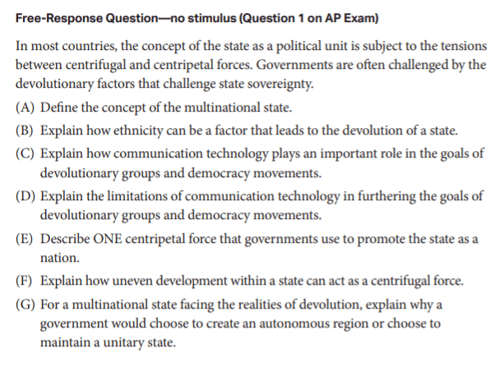
Step 1: Read the Introductory Statement
Before you start in on the first part of the question, be sure to read the short introductory blurb. It sets up the topic you'll be analyzing and gives you firmer ground to stand on when addressing the rest of the question.
In the sample question above, the introductory statement makes it clear that the question will deal with states, national governments, and tensions between the two.
Reading all the introductory statements for the three free-response questions in the section before you start answering any of the individual parts can help you decide where to begin. If you see a topic that is especially familiar, you might go for that question first as you'll be able to answer it the fastest.
Step 2: Identify the Task Verb (and Understand What It Means)
In each part of the question (A-G), it's a good idea to underline the specific task verb at play, that is, what it's asking you to do. This should help you keep yourself on track when responding to the question. Identifying these verbs will also get you in the habit of paying closer attention to the differences between each of the tasks.
Here are the most commonly used task verbs on the exam, according to the College Board :
Compare: Provide a description or explanation of similarities and/or differences.
Define: Provide a specific meaning for a word or concept.
Describe: Provide the relevant characteristics of a specified topic.
Explain: Provide information about how or why a relationship, process, pattern, position, or outcome occurs, using evidence and/or reasoning.
Identify: Indicate or provide information about a specified topic, without elaboration or explanation.
For example, a question that asks you to "identify" something will merit a much more succinct answer than one that asks you to "describe" it.
In part A of the sample question, the key command is "define," meaning you could just give a one-sentence answer that clearly outlines what a multinational state is. In part E, the task verb is "describe," which denotes a longer answer that elaborates on an example of a centripetal force that governments use.
Finally, parts B, C, D, F, and G all use the command verb "explain," which means you will really have to go into detail to earn a point for each part of the question.
Ultimately, you'll save time and earn points if you're careful to make these distinctions among task verbs!
Step 3: Reread and Double-Check Your Answer
Once you've finished writing your answer, reread the question and your response to make sure you've done everything it asked you to do . If you're satisfied, move on to the next part of the question, and repeat the process of identifying task verbs and trying to get the full point offered at each part of the question (always labeled A-G).
After you finish the last part of a particular free-response question, check over all your answers for that question one last time to ensure that everything is the way you want it to be. Then you can move on to the next free-response question.
Step 4: Pace Yourself
This is more of a general tip for the AP Human Geography test, but as you work through the three free-response questions, make sure that you're keeping track of time and pacing yourself .
As a reminder, you'll have one hour and 15 minutes to complete three FRQs. This means you'll get about 25 minutes per question; however, it'll be better for you to try to complete each question within 20 minutes . This way you'll have some extra time at the end to go back and look over your answers and tweak them if needed.

Review your answers with a second, more critical eye. I think this picture is photoshopped, but I don't know for sure because I don't feel like Googling, "Can you have two pupil/iris combos within one eyeball?" Just kidding, I did Google it, and it's probably not a thing, but not even the internet knows for sure . OoOoOoOo.
AP Human Geography FRQ Example + Answers
In this section, we'll go through the answer to a sample free-response question from the 2020 AP Human Geography Course and Exam Description .
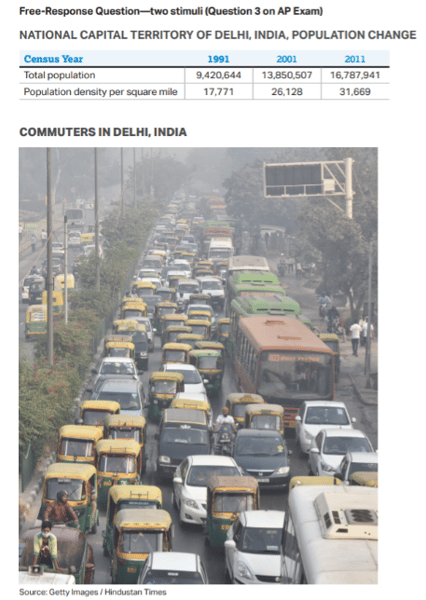
This question is an example of question 3 on the Human Geography exam. As you can see, there are two stimuli (a table and a photograph) and seven parts (A-G), each worth 1 point .
In order to earn full credit, here is what you'd need to write down as your answer, per the official scoring guidelines . (Note that there are multiple possible answers you could put down for A-G.) As always, pay careful attention to the task verbs being used!
(A) Answer Options
- Delhi is classified as a megacity because it has a total population greater than 10 million.
- From 1991 to 2011, Delhi's total population grew to over 10 million.
(B) Answer Options
Many people move to Delhi from rural areas and smaller cities ...
- in search of employment opportunities.
- in the hopes of improving their income or quality of life.
- to join family members or friends already living in Delhi.
- to have better access to services, health care, or education.
(C) Answer Options
- The city's center increases in the size, height, and/or number of large apartment buildings and condominium that attract a growing population of middle-class workers in the country's capital.
- Infilling occurs where open space presents an economic opportunity for landowners to build small multi-family housing units, placing more people into existing city blocks.
- The government is increasing its provision of public housing in apartment blocks within the city, which provide larger buildings with multi-family housing units.

(D) Answer Options
- A need for additional public transportation lines and/or added capacity on existing transit systems.
- A need for improved sanitation, water supply, waste disposal, or wastewater treatment facilities.
- A need for more housing, especially for lower-income residents.
- A need for improved communication or electric utility infrastructure.
- A need for additional public schools, colleges, universities, and/or libraries.
(E) Answer Options
Increased number of vehicles on the roadways results in visible air pollution, fog, smog, and/or airborne chemicals that lead to ...
- health problems.
- transportation accidents.
- diverting potential economic investment in the city.
(F) Answer Options
- India is a less developed country which has limited government funding to pay for pollution abatement programs (such as alternative fuels) or large investments in public transit.
- India has a growing industrial sector which has limited environmental regulations such as controls on air pollution. Industrial air emissions contribute to the city's air pollution levels.
- India has a large rural population and urban poor population who are dependent on burning wood for home heating and cooking. The smoke increases the city's air pollution levels.
- During the dry season, farmers in northern India will burn the dead vegetation in their fields (following the harvest) to improve soil nutrients. The smoke can increase the city's air pollution levels.
- As India's economy grows, more people can afford to own cars or buy trucks for their businesses. The additional vehicle increases the total amount of air pollution.
(G) Answer Options
- Transportation-oriented development of new housing, industrial and retailing areas. Or, laws requiring new developments be constructed with bus lanes, train lines, and stations.
- Vehicle restrictions, high-occupancy requirements, tolls, or congestion pricing to limit the number of vehicles on the roads.
- Smart-growth policies, slow-growth, or zoning policies that restrict the amount of land that can be developed or create a development boundary or greenbelt around the city.
- Alternative electrical energy and/or alternative fuel programs that are cleaner-burning or have zero emissions.
- New Urbanism or mixed land-use developments where workers live, shop, and work within walkable distances.
How to Practice AP Human Geography FRQs
You can find plenty of AP Human Geography free-response questions (and their corresponding answer guidelines) online.
The College Board maintains a collection of real free-response exam questions that were administered between 2001 and 2021 with sample responses and scoring guidelines. This is the best resource for FRQs because you can rest assured that they're accurate representations of what you'll see on the exam in terms of content and difficulty level.
While there's nothing wrong with using free-response questions crafted by test-prep companies for preliminary practice, you should always incorporate official questions into your studying at frequent intervals.
Other free options include high-quality, unofficial practice tests . Check out our guide to all AP Human Geography practice tests you can use for tips on what to prioritize in your prep.

What's Next?
Want an overview of the whole AP Human Geography exam with examples of both multiple-choice and free-response questions? Then take a look at our expert guide to Human Geography .
Looking for more resources to use in preparing for this tricky AP test? Check out my ultimate study guide for AP Human Geography !
If you want more free-response practice, then you might consider getting an AP review book to supplement the online resources listed in this article . Here is a list of the best review books for AP Human Geography .

Samantha is a blog content writer for PrepScholar. Her goal is to help students adopt a less stressful view of standardized testing and other academic challenges through her articles. Samantha is also passionate about art and graduated with honors from Dartmouth College as a Studio Art major in 2014. In high school, she earned a 2400 on the SAT, 5's on all seven of her AP tests, and was named a National Merit Scholar.
Ask a Question Below
Have any questions about this article or other topics? Ask below and we'll reply!
Improve With Our Famous Guides
- For All Students
The 5 Strategies You Must Be Using to Improve 160+ SAT Points
How to Get a Perfect 1600, by a Perfect Scorer
Series: How to Get 800 on Each SAT Section:
Score 800 on SAT Math
Score 800 on SAT Reading
Score 800 on SAT Writing
Series: How to Get to 600 on Each SAT Section:
Score 600 on SAT Math
Score 600 on SAT Reading
Score 600 on SAT Writing
Free Complete Official SAT Practice Tests
What SAT Target Score Should You Be Aiming For?
15 Strategies to Improve Your SAT Essay
The 5 Strategies You Must Be Using to Improve 4+ ACT Points
How to Get a Perfect 36 ACT, by a Perfect Scorer
Series: How to Get 36 on Each ACT Section:
36 on ACT English
36 on ACT Math
36 on ACT Reading
36 on ACT Science
Series: How to Get to 24 on Each ACT Section:
24 on ACT English
24 on ACT Math
24 on ACT Reading
24 on ACT Science
What ACT target score should you be aiming for?
ACT Vocabulary You Must Know
ACT Writing: 15 Tips to Raise Your Essay Score
How to Get Into Harvard and the Ivy League
How to Get a Perfect 4.0 GPA
How to Write an Amazing College Essay
What Exactly Are Colleges Looking For?
Is the ACT easier than the SAT? A Comprehensive Guide
Should you retake your SAT or ACT?
When should you take the SAT or ACT?
Stay Informed
Get the latest articles and test prep tips!
Looking for Graduate School Test Prep?
Check out our top-rated graduate blogs here:
GRE Online Prep Blog
GMAT Online Prep Blog
TOEFL Online Prep Blog
Holly R. "I am absolutely overjoyed and cannot thank you enough for helping me!”
404 Not found
- International
- Schools directory
- Resources Jobs Schools directory News Search
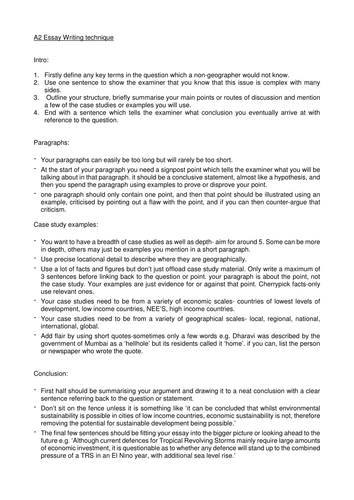
A Level Geography essay writing technique cheat sheet
Subject: Geography
Age range: 16+
Resource type: Worksheet/Activity
Last updated
- Share through email
- Share through twitter
- Share through linkedin
- Share through facebook
- Share through pinterest

Tes paid licence How can I reuse this?
Your rating is required to reflect your happiness.
It's good to leave some feedback.
Something went wrong, please try again later.
This is a fantastic document. I gave it to my A level set and noticed a huge improvement in their writing.<br /> <br /> Thank you for sharing!
Empty reply does not make any sense for the end user
Report this resource to let us know if it violates our terms and conditions. Our customer service team will review your report and will be in touch.
Not quite what you were looking for? Search by keyword to find the right resource:

IMAGES
VIDEO
COMMENTS
Essay Structure Each essay has the general structure of introduction, body and conclusion. Introduction There needs to be a clear introduction where you: o state what the essay is about o provide some background to the topic e.g. why it is important o set the parameters of your essays e.g. a case study of Brazil is examined (stating
Grab Attention: Choose a topic that interests you and your readers. Show with Examples: Use real examples to explain geography concepts in your essay. Stay on Track: Make sure everything in your essay relates to the main message. Use Sources: Share your thoughts based on what reliable sources say.
The crucial point for a successful geography essay is selecting an engaging and appropriate topic. To choose a topic that resonates, consider current events, your interests, and the scope of your assignment. A good topic should captivate your interest and offer sufficient scope for in-depth study and analysis.
Essay questions tend to use the command words "to what extent" or "assess". According to AQA, if the question includes the "to what extent" command word, you should "Consider several options, ideas or arguments and come to a conclusion about their importance/success/worth". On the other hand, if it is an "assess" question ...
5 The essay must be an answer to one of the questions from the list of Essay Topics. Do not answer only part of the question. Do not change the question to something you would rather write about. 6 There must be an introduction, in which you explain what you understand the question to mean and in which you outline your approach to answering it.
Do not bring in new points in the conclusion. Avoid the use of the first person in your paper. Always conclude with a grand statement that supports your topic or thesis. One paragraph, one idea. Exhaustively address a single point in one paragraph. All opinions expressed should be relevant to the topic.
30 days online access to complete issue. Article PDFs can be downloaded. Article PDFs can be printed. USD 1,038.00 Add to cart. * Local tax will be added as applicable. Essay writing is a fundamental skill for many students, both in human and physical geography as well as other disciplines. An essay is a short piece of writing (often no more ...
When we say a professional piece of essay writing, we don't just mean the tone to be professional. We're saying the structure of your paragraphs and the length should be relatively similar. Do not write excessively long paragraphs, followed by a shorter one. Keep the length the same with the same font size and design.
How to write an Essay; New Print Books; Print Books; Online Books; Quick References; Databases: Finding articles; Journals; Lean Library; Dissertations & Theses; ... Writing a Geography essay. How to write an Essay. Writing tips << Previous: Publishers Deals (OA Research) Next: New Print Books >>
How to write an Essay; Searching Instructions; Login to Online Resources; Past Exam Papers; Prescribed & Recommended Print Books; Quick References; Databases: Finding articles; Lean Library; Reference Techniques; Reference Techniques: Video Tutorials; Online Books: UJ Library Tutorials
Expressive writing is the form used for thinking and exploring ideas. This more personal form of writing involves students exploring the geography meanings in the topic they are studying to reveal what they believe and think. This form of writing is important to emphasise the personal view - a letter for example.
Structure Your Geography Essay Properly. This part of the writing process requires you to organize the ideas gathered during the prewriting activity. Therefore, the outline prepared beforehand can help you to write the entire essay. The structure of the Geography essay may depend on the selected essay type.
The choice of topic is the first step to passing papers on geography. Choose a topic that you are conversant with. This makes it easier to write without too much geography essay writing help. The topic should be catchy and precise to capture the attention of the reader. The topic should not be overly broad.
The essay must be fixed at all times to the command word and based on the subject. This is achieved by frequently tagging the subject into your argument. The argument must be balanced. This means a critical awareness of different perspectives and interpretations of evidence. This does not mean that all perspectives have equal importance ...
Harvard College Writing Center 5 Asking Analytical Questions When you write an essay for a course you are taking, you are being asked not only to create a product (the essay) but, more importantly, to go through a process of thinking more deeply about a question or problem related to the course. By writing about a
Lots of students think the best thing to do in an introduction is to do the following: Restate the question in your own words. Define each key term in the question. Ask a rhetorical question. Sure; your teacher might like that. But in the exam, when you have about 30 minutes to write a three side essay, it's not a very effective way of ...
Sentence 3: Close the debate. Make clear the main reason you think that one side is better than the other. For example: "The benefits are clear and undebated, whereas the negatives may have far more complex underlying causes.".
Follow your outline, using each of your supporting points as the topic sentence of its own paragraph. Use descriptive words to get your ideas across to the reader. Go into detail, using specific information to tell your story or make your point. Stay on track, making sure that everything you include is somehow related to the main idea of your ...
AP Human Geography Free Response Section Format. There are three questions on the free-response section, each worth 7 raw points. You'll get one hour and 15 minutes to answer all three questions, or about 25 minutes per question. Your free-response score accounts for half your AP Human Geography test score (the other half comes from your ...
Time management. You'll have 22 minutes maximum to complete the 10-mark essay, as the you'll need the remaining 38 minutes for the 15-mark question. In above-mentioned 22 minutes, you should jot down a brief plan (1-2 minutes) and then write. Once yourself end, give self 2-3 minutes to reread and check choose response.
There are a number of different types of question that could be asked in a geography exam or assessment. Each type needs a particular technique in order to answer it. There are two important ...
2. Quickly plan your essay out. Once you've read the question, take a minute to brainstorm some ideas. Make sure to jot down any relevant information, facts, and figures that you definitely want to use in your essay. This will help you to get your thoughts in order and make writing your essay a lot easier. Make it clear on your exam paper ...
A Level Geography essay writing technique cheat sheet. Subject: Geography. Age range: 16+. Resource type: Worksheet/Activity. File previews. docx, 485.9 KB. A bullet point tick list guide taking students through introductions, main essay body and conclusions, complete with examples of each. Was used as a basis for my lecture on A Level exam ...